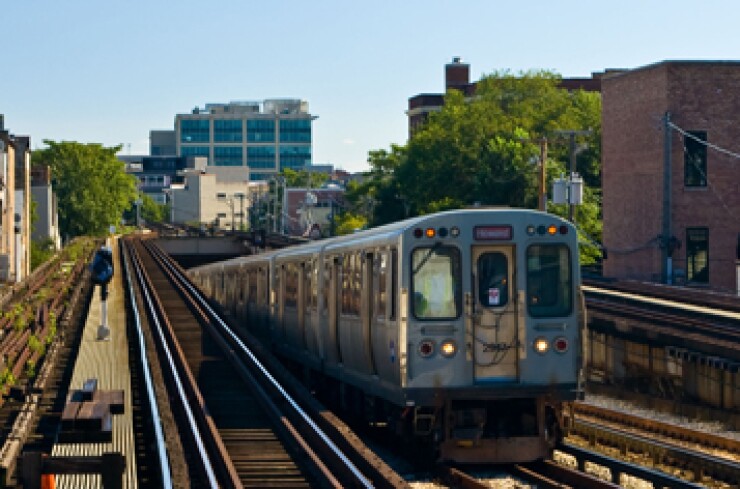
CHICAGO – The Regional Transportation Authority of Illinois kicks off the New Year with a rare new money borrowing as it looks to avoid state-related credit fallout.
The $108 million deal follows the RTA's recent approval of a $2.9 billion 2016 operating budget and five-year capital program totaling $3.9 billion.
The RTA, the third largest transit system in the nation moving more than 2 million passengers daily in the northeastern region of Illinois, provides financial oversight of three service boards: the Chicago Transit Authority, Metra commuter rail, and Pace suburban bus service.
Ahead of the Jan. 13 competitive general obligation bond sale, rating agencies affirmed double-A level ratings on $2 billion of debt.
Moody' Investors Service shifted the outlook on its Aa3 rating to negative, citing over exposure to the state government's "continuing credit deterioration, which threatens to exacerbate ongoing aid payment delays in coming months, barring an agreement to compensate for the state's recent revenue losses."
Moody's said the Chicago area is economically vulnerable to tax increases needed to address pension liabilities, which could dent regional sales tax collections, which also played a role in the outlook shift.
Fitch Ratings and Standard & Poor's affirmed their AA ratings and stable outlooks.
The sale comes one day ahead of the much lower rated state government's competitive $480 million GO bond sale.
The RTA rating reflects analysts' expectation that the authority will manage liquidity despite "the challenging revenue climate," said Standard & Poor's analyst Jennifer Boyd.
The RTA faces both near and longer term state exposure.
It has suffered from payment delays as the state government grapples with dwindling cash and nearly $8 billion backlog of unpaid bills amid a six-months-and-counting budget impasse.
On a favorable note, the delays are shorter, down to a few months from previous highs of up to six months in 2011 and 2012.
"A return to chronic delinquencies could adversely affect system maintenance, and present ongoing risk to the authority's financial health," Fitch said in its rating report. The RTA has $400 million of short-term borrowing authority to manage liquidity.
The state budget impasse has delayed the distribution of $3 million in the agency's share of use taxes. The RTA's more-important sales tax collections are protected because they bypass state government operations and don't require an appropriation for distribution.
Longer term, state aid levels are at risk due to Illinois' fiscal mess.
Gov. Bruce Rauner's original fiscal 2016 budget that was rejected by the General Assembly's Democratic leaders cut transit spending by $170 million. The proposal prompted a warning from officials that higher fares and service cuts would be needed.
Aside from state funding exposure, the primary strain on the RTA's fiscal foundations is capital.
"The RTA faces a serious challenge in the condition of its system assets," Fitch said.
The RTA's service boards have a backlog of nearly $20 billion in needed work with its 10-year capital program requiring $36 billion to bring the system to a state of good repair.
The RTA's five-year $3.9 billion capital program is funded through a mix of federal funds, aid, and more borrowing by both the RTA and CTA. The RTA has just limited room for more borrowing under its existing state-granted authority.
The RTA board earlier this month signed off on operating and capital budgets that are optimistic in assuming that state funding levels will remain stable. The agency also sought to highlight the positive on the capital side in passage of the federal transportation package.
"The recent passage of the Fixing America's Surface Transportation or the FAST Act is a bright spot in the long term capital budget process," said RTA executive director Leanne Redden. "It's estimated that these increased levels of funding could translate to more than $250 million in additional formula funding over a five year period for our region."
The operating budget includes the CTA's spending plan for $1.47 billion, Metra's budget of $759.8 million, Pace's $228 million budget, the RTA's operational costs, and paratransit spending.
The five-year capital plan anticipates $870 million of 2016 spending for express bus routes, light-rail upgrades, Metra mobile ticketing and fleet modernization, Pace express bus service and construction of new garage.
In addition to federal grants, the 2016 capital budget relies on $357 million of CTA borrowing. Moody's recently affirmed the A1 rating and negative outlook carried by the CTA's sales tax revenue bonds.
The Chicago Civic Federation in an analysis last month endorsed the CTA's budget but warned of potential complications due to the six-month-old state budget impasse.
"The CTA is continuing to benefit from reforms made in its past four budget cycles," federation president Laurence Msall said in a statement. "However, the federation again warns the CTA not to rely on the restoration of state funding for reduced fare subsidies."
The federation urged the CTA to present an alternative budget plan and re-evaluate its state mandated free and reduced fare programs. "These actions will help keep the agency on a more fiscally sustainable path, particularly with significant capital funding challenges and back-loaded debt service costs projected for future years," the report said.
The federation also expressed ongoing concerns over what it considers CTA's overly optimistic expected investment rate of return of 8.25% on its pension fund.
The rate is higher than other local funds that have targeted rates in the 7% range. The federation also urged the CTA to establish a level principal policy on its borrowing.





